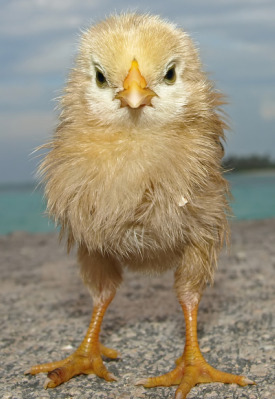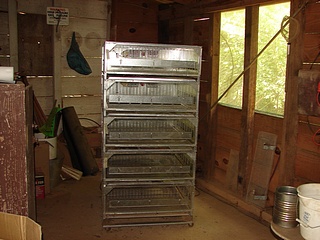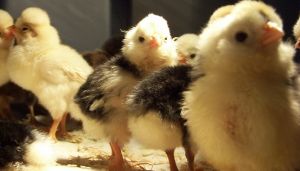Raising Baby Chicks

Before you rush off and purchase your baby chicks make sure you prepare yourself with the knowledge and supplies you need for raising happy healthy chickens.
Items you will need:
Supplies needed for raising baby chicks:
The first thing you will need for raising baby chicks is a brooder. Brooders come in many different shapes and sizes. It can be a plastic tote, an old dog kennel/airline carrier, plastic swimming pool or a cardboard box. It needs to provide a space that gives the baby chicks a heat controlled draft free environment. Allow at least 1 - 2 square feet for each baby chick. In this case bigger is not better.
Your brooder should provide protection from dogs, cats and other chicken predators.
To protect your baby chicks from predators make a top out chicken wire so that it covers your entire brooder.
Heat
For raising baby chicks start your brooding temperature at 95 degrees and reduce it by 5 degrees every week. The best way to control the temperature (in your brooder) is to suspend a heat lamp above the brooder at different heights. You can also vary the heat by changing the wattage of the bulbs. If you want to get more precise, drop a small thermometer on the litter below the light.
How to tell if your baby chicks are too hot or too cold:
While raising baby chickens you will get faster growth by exposing them to light for 24 hours a day during their first 4 weeks of life. Provide as much natural light as possible.

New chicks can be raised on a wire bottom with a tray to catch droppings or with some type of litter shaving (preferably not cedar shavings - some chicks may be allergic to the strong cedar scent). Even though a wire bottom is easier to clean, I raise my chicks using pine shavings. Raising baby chicks on shavings gradually exposes them to Coccidia. This allows them to build up an immunity. Litter also provides insulation for warmth. You can also use crushed corncob, peat moss, crushed cane or vermiculite.
During the first 2 days of raising baby chickens, lay paper towels on top of the litter. Do not use newspaper or anything else that is slick. This can cause injury to the chicks. Sprinkle a small amount of feed on top of the paper to get them use to eating.
After a couple of days remove the paper towels and fluff up the litter. Always make sure to remove any wet litter from your brooder. Mold can develop causing brooder pneumonia. Many diseases can be prevented by applying good hygiene.
Watering
When chicks first hatch they can go without water or food for the first 48 hours. However, to reduce stress it is recommended that you get them water as soon as possible.
As you place each of your baby chickens into the brooder, dip each chicks beak into the water and only let go when it swallows water. Adding a vitamin solution to the chicks water for the first week will help in getting them off to a good healthy start.
Always have clean water available to avoid dehydration. I use a mason jar attached to a plastic base.

Set the water up so that it is level with the chick's back. Check on it several times because they will constantly be filling it with litter. Never use a bowl or any open source of water. Chicks can drown and or contaminate the water with droppings.
You will know when it is time for a bigger waterer by the amount of times you have to fill up the waterer. This usually happens with in 7 to 10 days.
When you purchase a new waterer make sure it has these features:
If you want to learn more about chicken waterers click here.
Feeding chicks
As with water newly born baby chickens can go 48 hours without food. But to help relieve a chicks stress feed them as soon as possible.
Chick Starter is recommended for new chicks. It is higher in protein and lower in energy. Never feed any rations with calcium to baby chicks. It can damage their kidneys. Some people like to feed a medicated feed to baby chickens.
You should only use medicated feed if:
If your chicks are born late winter or early spring you should be fine using a non-medicated feed (Coccidia needs warm weather to survive).
Chick Feeder
During the first few days place starter feed in a small lid. When the chicks start scratching and covering it with litter change to the small chicken feeder.
Quality chick feeders have these characteristics:
As with the waterer use a solid base to place the feeder on. Make it level with the chicks backs.
In about 2 weeks it will be time to change to a trough type feeder or hanging feeder.
Things to be aware of while raising baby chicks
Do not be surprised if you experience a death or two of your baby chicks. Most chicks (if they are unhealthy) will die in the first 7 to 8 weeks. Many deaths occurring at one time means you could have an outbreak of a disease.
It is recommended raising baby chicks at least 300 feet from your adult birds for the first 8 weeks. This gives your chicks time to build up an immunity to various diseases.
Till your baby chickens, build up an immunity try to find a probiotic formula to put in their water or sprinkle on there feed. Another alternative is using live culture yogurt (too much will cause diarrhea). Try to keep your chicks as stress free as possible. Over stressing can reduce their immunity.
If you notice your chicks with soft dropping stuck to their rear-ends, you will need to gently pick this off. This is a condition called Pasting. Pasting can block a chicks vent sealing it shut causing death. It is usually caused from improper feeding or a chick that is either getting too hot or too cold.
There are other things to be aware of but if you are raising a small backyard flock and have invested the time and care for raising baby chicks, you should not experience nearly as many issues that the larger producers experience. So provide your chicks with lots of love and care and they should grow to give you lots of fun, food and entertainment.

Custom Search



New! Comments
Have your say about what you just read! Leave me a comment in the box below.